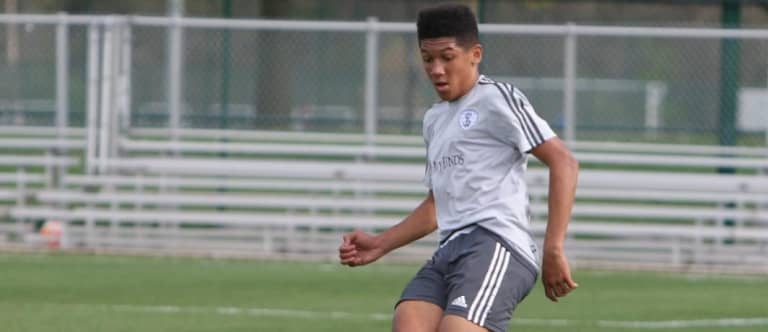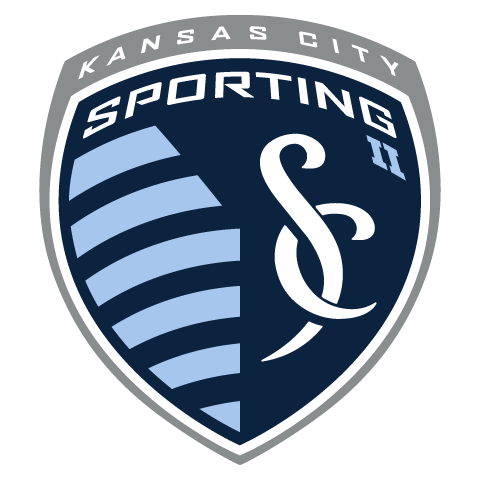KANSAS CITY, Mo. – After a wild, often bumpy and historically long ride through the playoffs, Swope Park Rangers are in their second USL Cup final in as many seasons of existence. But the jury is still out on whether Sporting Kansas City's second-tier team will be successful in accomplishing the parent club's goals.
That has less to do with how Rangers do on Monday night in the title game at Louisville City FC, Sporting manager and technical director Peter Vermes says, than with how much the side assists in player development – especially in serving as a conduit from the Sporting Academy to the senior team.
Sporting have signed a number of players from the SPR roster. This season there have been five, including goalkeeper Adrian Zendejas, who recorded a clean sheet and struck the decisive spot kick in an 11-round penalty stage against Oklahoma City Energy in the USL Western Conference final. But they are still playing at the USL level on loan, for the most part, and Sporting have yet to find an impact player from the lower-division ranks.
“As much as I think that's been good for them,” Vermes told reporters earlier this month, “that's never been the objective for that team, to be a team that's trying to win the championship there. That has to be a byproduct of what that team is there for.
“That team is there to develop players, either on our senior team that we're loaning down to get time and continue to build them up as young guys, or to take guys that are coming through the academy that we think have the ability – such as [Gianluca] Busio and [Jaylin] Lindsey – to sign them and have them make the next step into the senior team by using that as sort of an opportunity to bridge the gap.”
Several midsummer moves in 2017 could foreshadow a transition toward more of what Vermes envisions for SPR, though, with teenage Homegrowns Busio and Lindsey (pictured below) signed to join the senior roster in 2017 after starring in academy play. (Lindsey made two appearances for Rangers in 2016, when he was 16, but has not played for them this year.)
“We have a long way to go toward doing that,” Vermes said. “That's a process and that takes time. Guys need games. But we're definitely in the right direction. We made a big step from last year to this year in regards to our model of play, so that the guys are now training in the way that they play the games that they play.
“That so much more resembles the way we do what we do, so that when a guy does come up, the transition is almost seamless. That's what we're trying to get to, and it's getting there.”
Having a club-owned USL team in Kansas City – after previous affiliations with Orlando City SC and Oklahoma City – has also allowed Sporting to give minutes to lesser-used players and those working back from injury without sending them out of town.
While Vermes' assessment of SPR's strategic success is still to be determined, they've definitely given their fans some big moments – especially in the playoffs – in their two seasons of existence.

Last year's team, led by Marc Dos Santos, highlighted a run to the USL Cup final with a 9-v-11 victory against Orange County in the West semifinals. But this year's craziness, under former Dos Santos assistant Nikola Popovic, has eclipsed even that.
SPR opened the postseason by advancing past Didier Drogba’s Phoenix Rising FC in a drawn-out quarterfinal played over two days – one half on each day, with a torrential thunderstorm in between.
Then, despite Swope Park's higher seeding, USL initially moved the conference semifinal to Sacramento – citing concerns with Swope Soccer Village's facilities – before moving the match (and all subsequent playoff action) to Sporting's home ground, Children's Mercy Park in Kansas City, Kansas.
A 1-0 victory there set up the wild West final. That featured the longest shootout in league history, capped when Zendejas rolled home the winner after making a save in the first half of the round – and then led the team into the stands to celebrate with supporters.
“It's just like the senior team,” Vermes said. “If you don't have a model of play, you don't have a purpose in the way that you want to go out and play and get a result – if you don't have that, the byproduct is not going to be winning. It's not going to be going into the postseason.
“So the objective is, if you do the other first, the byproduct is then what you see. We're getting into the postseason and we're finding a way to get down further into that tournament. That's a great thing, and it's great experience – but again, it comes because of the first part, and that's the most important part for me with that team.”



